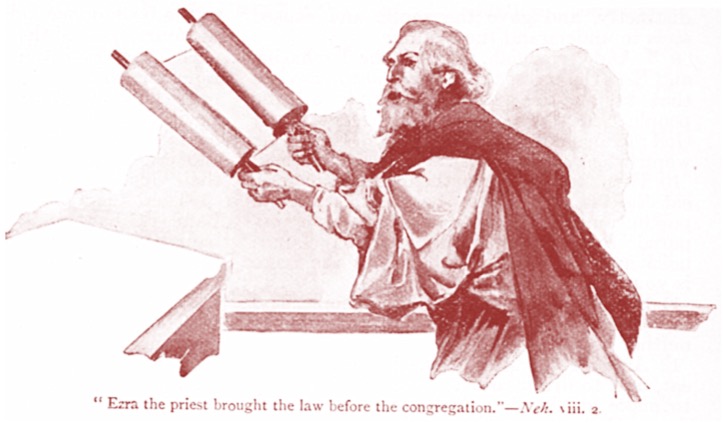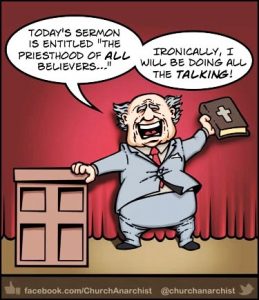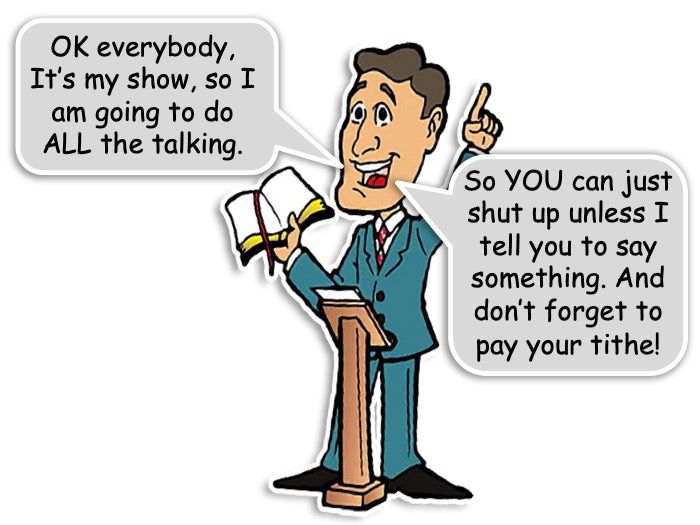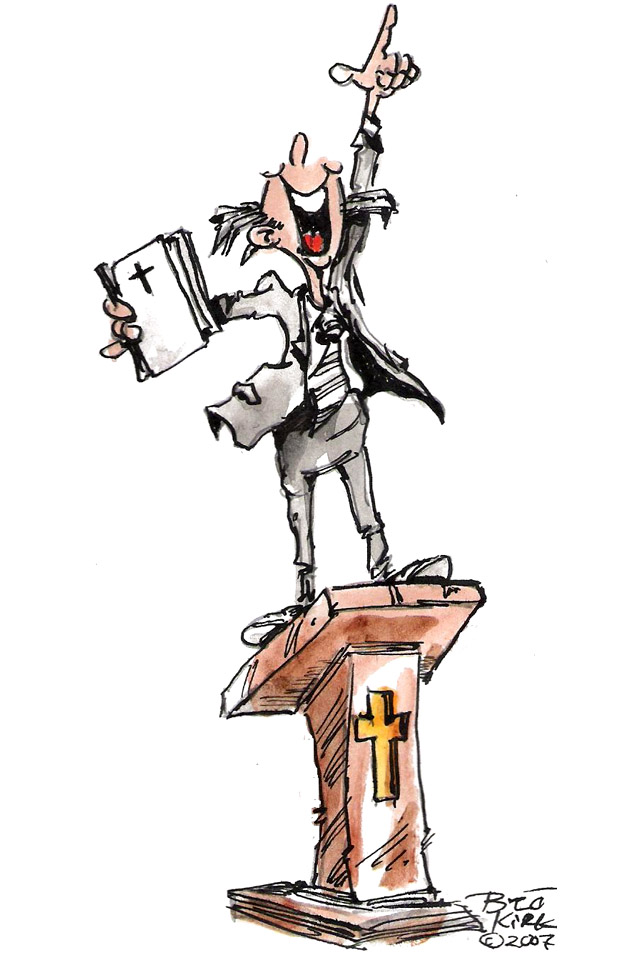The Royal Priesthood
(The Proper Role Of All Believers In The Local Church)
W. Carl Ketcherside

The ideal of God for a kingdom composed entirely of priests is achieved in the relationship created by the new covenant. That which could not be accomplished at Mount Sinai has been accomplished at Mount Sion, where we received a kingdom which cannot be moved or shaken. Every child of God is a priest, everyone is now a minister.
In the Revelation letter John informs us of Jesus “who loves us and has freed us from our sins by his blood and made us a kingdom, priests to his God and Father.” (Rev.1.5,6) This one statement tells us of the motivation (love), the action (freed us), and the means (his blood), by which Jesus achieved his goal of founding a unique kingdom.
Because of the priestly nature of the kingdom, celestial voices are raised in this hymn of praise:
“Worthy art thou to take the scroll and to open its seals,
For thou wast slain and by thy blood didst redeem men for God
From every tribe and tongue and people and nation
And hast made them a kingdom and priests to our God.” (Rev.5.9,10)
Let us examine the language of the Spirit. The terms “high priest” and “chief priest” are found 123 times in the new covenant scriptures. Of these occurrences, 113 directly or indirectly refer to the high priests or chief priest of Judaism.
The ten exceptions are all located in the epistle to the Hebrews and are direct references to our Lord Jesus Christ. They present him as the great high priest who was foreshadowed by the high priests under the law of Moses. Accordingly, there is not a hint in these occurrences of any priest in the kingdom of God, except our Lord himself.
The Greek word for priest is hiereus. The term “priest” is found 33 times in the new covenant scriptures. It refers to the Levitical priests 18 times. Of the fifteen remaining occurrences, 8 refer to Christ, 3 to Melchizedek, 1 to the pagan priest of Jupiter, and the other 3 to the entire membership of the community of saints, who are described as “a kingdom, even priests.”
The word “priest” is never once applied to a special ministry or caste in the congregation of our Lord. No gospel preacher, pastor, elder, or deacon, was ever referred to as a priest in any distinctive sense; no such individual was a priest by right of office.
The word “priesthood” is found but six times in the new covenant scriptures. Four of these appearances are in one chapter (Hebrews 7). In every instance the four refer either to the Levitical priesthood or to that of our Lord. The other two instances are also found in one chapter. They designate the entire body of believers as “a holy priesthood” (1 Peter 2.5), and “a royal priesthood.”(1 Peter 2.9)
Nothing is clearer than the fact that in the primitive Christian community there was no priesthood other than that of the Lord Jesus Christ and every one of his followers, who were to “offer up spiritual sacrifices acceptable unto God.” The special priesthood which is so prevalent in our day has no scriptural precedent under the rule of Jesus. It has been created by men and has arisen without divine warrent. It usurps the privileges and prerogatives which belong to all alike. It makes a pretentious claim to authority but it asserts a divine right without a word of divine writ to sustain it. God’s magnificent plan for the ages culminates in every saint recognized as a real priest. Any attempt to promote a special priesthood clothed with special powers to minister in things pertaining unto God thwarts the divine purpose. It exists as an affront to the Great King and his humble and loyal subjects.
In spite of this we are faced with the fact that in our day the idea of a special priesthood to minister for and in behalf of other saints is so prevalent that a majority of believers have no concept of the people of God functioning in any other manner. Few indeed realize that they were ever intended to be priests, and their idea of priesthood has been so conditioned by the subservient role to which they are reconciled that they find it ludicrous to consider themselves as priests in any sense.
The danger of this lies in the fact that the kingdom of heaven is designed to be a kingdom of priests. It derives its nature from a citizenry composed of priests. If we create a wholly different order in which the citizens disclaim any relationship as priests, there is a question as to whether it can be regarded as the kingdom of heaven or not. To what extent can we alter the fundamental constituency of the kingdom of heaven and still regard ourselves as composing it? Perhaps nothing is more important for our generation than a recapture of the royal priesthood.
This brings us to the place where we may well investigate another word – clergy. It is from the Greek kleeros which means “a lot, an inheritance.” In the original it occurs thirteen times in the Scriptures. It is rendered “heritage”-1 time, “lot”-3 times, “lots”-5 times, and “part”-2 times. The word is never used to mark off a segment or portion of God’s people from the rest in the new covenant scriptures. All who have been redeemed and have entered into Christ constitute the heritage (clergy) of God. He has not selected a special group to serve as his lot or inheritance.
This was not true under the legalistic regime created by the old covenant. Then God had a special inheritance, a clergy to act as his special functionaries. “At that time the Lord set apart the tribe of Levi, to carry the ark of the covenant of the Lord, to stand before the Lord to minister to him, and to bless in his name to this day. Therefore Levi has no portion or inheritance with his brothers; the Lord is his inheritance, as the Lord your God said to him.” (Deut.10.8,9)
Observe that here a special group was set apart, or ordained to minister unto God and to pronounce a blessing or benediction upon the remainder of the congregation in God’s name. Under Judaism there was a distinction between the clergy and the laity. There were certain rituals reserved exclusively for the priests, or clergy, to perform. The people were not permitted to enter the sacred areas or to engage in the clerical functions.
Inasmuch as the Levitical priests constituted a special clergy to minister unto God, they were to be supported in their clerical duties by those in whose behalf they ministered. “The Levitical priests, that is all the tribe of Levi, shall have no portion or inheritance with Israel; they shall eat the offerings by fire to the Lord, and his rightful dues. They shall have no inheritance among their brethren; the Lord is their inheritance as he promised them.” (Deut.18.1,2)
Nothing is clearer than the fact that under ‘the ministration of death” which was written and engraved in stones, God created a clergy with certain sacerdotal (priestly) functions. Those who composed it wore distinctive robes and stood between the people and God. But all such distinctions were rendered invalid by the cross of Christ.
We are not under law, but under grace. “The law came by Moses, but grace and truth came by Jesus Christ.” We are under a better covenant based upon better promises. Under the reign of grace God no longer has a special tribe ordained as clergymen. Through grace every child of God is sanctified and anointed, set apart and ordained to offer spiritual sacrifices acceptable unto him. We are all God’s portion or inheritance in the world.
Every Christian is a clergyman in the only scriptural usage of the term. To create a special clergy is to lapse back into Judaism. It is easier to live under law than under grace. Law creates its special interpreters and judges, and the community can rest in their judgment and be relieved of personal responsibility. When problems arise men can “go up to the priest,” and his clerical interpretation becomes the authorized guide. Yet it was from this very system Jesus died to deliver us. He made us free from all priestly and hierarchical domination.
It is impossible to create a special clergy without, by the same act, creating a laity. The word Laos from which we get ‘laity” is found at least 141 times in the new covenant scriptures, where it is translated “people.”
In every instance when applied to the community of Christ it refers to the whole body of believers. It never refers to a group as distinguished from a priestly or ministerial class. This was not true under the legalistic covenant. There was always a careful line of distinction drawn between the priests (clergy) and the people (laity).
“And he (the high priest) shall make atonement for the priests (clergy) and for all the people (laity) of the assembly.”(Lev.16.33) “These preparations having thus been made, the priests (clergy) go continually into the outer tent, performing their ritual duties; but into the second only the high priest goes, and he but once a year, and not without taking blood which he offers for himself and for the errors of the people (laity).”(Heb.9.6,7)
The great difference under the new covenant is illustrated in one important verse. It affirms the priesthood of all believers and uses the term laos to designate the same group. “But you are a chosen race, a royal priesthood, a holy nation, God’s own people (laity), that you may declare the wonderful deeds of him who called you out of darkness into his marvelous light.”(1 Peter 2.9)
This is a significant passage because it identifies the royal priesthood with God’s laity. Every priest of God is one of his laity, every member of God’s laity is a priest. Every child of God is his lot or inheritance through the blood of Jesus, therefore, all of God’s children constitute his clergy. Since they also constitute his laity, there can be no distinction between clergy and laity in the kingdom of Christ.
It is worth noting that Peter declares that Christians are God’s laity (people), “that you may declare the wonderful deeds of him who called you out of darkness.” God’s laity are not those to whom messages of God are brought. They are themselves the bringers of a message. The laity are not those who listen to a clergy declare the wonderful works of God; they are the clergy who do the declaring.
It is sad indeed to contemplate how far we have fallen away from God’s ideal of the priestly citizenry. It is not uncommon to hear Christians excuse themselves for their ignorance or apathy with the words, “After all, I am just a layman.” This is equivalent to saying “I am just one of God’s people.” The tragedy is that those who thus speak proceed to act is if they are not God’s people.
The [conventional] clergy are expected to engage in religious activities, to walk circumspectly, to employ proper language, to visit the sick and study the Bible. This is regarded as the field of clerical function. This is what the clergy is paid to do. Those who are “just laymen” live on a different plane. Their function is to go listen to the clergyman and pay his salary for performing a priestly role. But all of this is as far from God’s program for the Christian life as the blood of Christ is from the blood of bulls and goats.
Just as any attempt to create a special clergy must result in a laity, so any attempt to create a distinctive laity must result in a special clergy. Sometimes men seek to avoid the implications of their philosophy by employing other terms to designate what they create. They frequently borrow scriptural terminology in the vain hope that a thing may be sanctified by placing a good name over it.
But we may designate the clergy system by whatever terms we will, borrowing the language of apostate ecclesiasticism, or “stealing the livery of heaven” in which to clothe it, yet the fact is that so long as the idea of a special ministerial caste exists, and the remainder of the saints are regarded as “the laity,” then we are nearer to Rome than to Jerusalem. And we are standing at a mount that can be touched rather than before Mount Sion.(CF: Heb.12.18-24)
Let us be very plain so there can be no ground for misunderstanding. We may call our clergyman “our minister,” “pastor,” or just plain “preacher,” but if he occupies a place of prominence in the assembly of saints as the front man for the congregation, if he is the exclusive minister, by virtue of his office, “to declare the wonderful works of God,” when the whole community comes together in one place, and if other saints are excluded from the opportunity by his very presence, we have a special clergyman. A preacher can be a clergyman as easily as a clergyman can be a preacher.

It is going to be very difficult to recover the abandoned ideal of the universal priesthood of believers. This is true for several reasons. The greatest deterrent is the bitter opposition to it by many who profess to be followers of Jesus. We have converted men to systems, structures and organizations. They have no real sense of vital relationship to Jesus as the head of a living organism. They are often lazy, indifferent and unconcerned. And many who never thought of fighting the devil will fight the thought of returning to the responsible role of priesthood. Too, we have been betrayed into measuring spiritual growth by numerical statistics. We have two criteria by which to judge our success–attendance and contributions. This may well be called ‘the scholar-dollar” fallacy. It operates on the assumption that the greater the number in Sunday School and the greater the bank account the closer to heaven we are. Actually there may be little relationship between the number of dollars in the bank and the number of names in the Book of Life.
To abandon the clergy-oriented modern institution for the Spirit-filled community of saints in the first century is the last thing most people will consider. It is probable that the primitive community was more adapted to meaningful meetings in small homes, third floor walk-up tenements (as at Troas), or in catacombs and caves. Here those who were fighting for survival of a cause could come and bind up their wounds, share their experiences and exhort one another to shoulder the cross again. Their problem was not the institutional community image but how to survive individually until the morrow.
We must be realistic enough to recognize that we live in a modern world. There are many conditions in twentieth century America which were undreamed of in first century Palestine or Asia Minor. Religion has been institutionalized for many centuries. Millions who want to follow Jesus do not think of themselves as runners, pugilists [prize-fighters] or soldiers in a spiritual sense. References to such activities are regarded as portraying a quaint symbolism of a bygone era.
We are resigned to being spectators rather than participants. The action is to be carried out by trained professionals. We are the drama critics who sit in favored locations and observe the presentation without ever becoming really involved. We are like natives watching a battle from the hills whose special interests favor one side in the conflict, but who never move down into the fray.
It is evident that a priestly role involves service to God. A priest under the old covenant did not act by proxy. He was not a mere onlooker but an active sharer in the responsibilities pertaining to the temple. But this was only a step in the divine program which was to culminate in a universal priesthood of all believers.
Our tragedy is that we have been betrayed into going back to before the cross and reinstating the concept of priesthood which was a part of Judaism. We have again created a professional priesthood to minister in our behalf. We think of the pulpit as “a holy place” in “the sanctuary” where only those with special ordination or anointing may officiate.
In many cases those who enter the pulpit wear robes to distinguish them from the rest of the saints. They regard the speaker’s stand as a “sacred desk” and pronouncements made from it may be uttered in a special “religious voice” adopted for the occasion.
The minister may develop a sense of importance as to his position and speak about “my elders,” “my church,” “my laymen.” If he ever regards the body of believers as constituting a priesthood he regards himself as a sort of local high priest whose task is to correlate and be responsible for a ritual or liturgy by which men approach God through his leading or direction. This has tended to institutionalize the church and to eliminate the family feeling so essential to the maintenance of brotherly love under the fatherhood of God.
From time to time there have been movements sparked in the history of the Christian community to get rid of the clergy. John Milton led such an attempt in his day and directed a vitriolic attack. Unfortunately most of these ventures were as negative as they were antagonistic. They were anti-clerical and were directed toward the goal of reducing the clerics to what is called lay-status.
It would seem that a reverse approach would be more in keeping with God’s purpose. Those who think of themselves as as “the laity” should be taught to regard themselves as “priests of the most high God,” and should be equipped for the fulfillment of the priestly function required by the new covenant.
We must come to recognize that God’s only sanctuary is the human heart consecrated and dedicated to the high calling of Christian service. In the economy of Christ, priest and sacrifice become one. Jesus offered himself, and it is written, “we are sanctified through the offering of the body of Jesus Christ once for all.”(Heb.10.10) As a part of the priesthood inaugurated through this universal sacrifice we also must “present our bodies a living sacrifice, holy, acceptable unto God, as a spiritual service.” (Romans 12.1)
Unfortunately, we have been betrayed into erecting temples and tabernacles in which we dedicate sanctuaries, and we tend to think of what we do in such special places as service to God. But all of this is pre-Christian and Judaistic in origin. It actually nullifies the power of the cross, while pampering our pride and salving the conscience. Temples require priests, vestments, liturgies, orders of service, and a great many other things wholly unknown to the new covenant. We have actually forsaken “the order of Melchizedek” for that of Aaron and Levi, and have reverted to “the law of a carnal commandment” in preference to “the power of an endless life.”(Hebrews 7.16)
This does not mean that members of the royal priesthood should not assemble together. Indeed, the very epistle which says the most about priesthood specifically says we should not forsake the assembling of ourselves together. But the same passage tells us that the purpose of our convening should be to incite one another to love and to good works, and to encourage one another. (Hebrews 10.24,25) We do not meet to conduct a service to God, or to offer a ritualistic sacrifice. We are the sacrifice.
This means that wherever a child of God is, there God is in his sanctuary. If one works at a lathe in the shop, at a desk in the office, at a table in the laboratory, or at a counter in the store, he is God’s priest in that place, and whatever he says or does must reflect the glory of God.
It is very difficult for one who works on an assembly line to see how the affixing of three nuts to their respective bolts can have any regal or priestly significance, but this is because we are not trained to see how God uses things to open up doors of ministry. Jesus took advantage of a well curb when he was tired to talk to one woman who was a social outcast, and through her, ministered to a whole city. So priests of God can use coffee-breaks and lunch hours in our own day of industrialization.
One of the major differences between Judaism and the Christian community is that under the former the important thing was the place where the sacrifice was offered, while under the latter, place has lost significance. The true worshipper no longer thinks in terms of a particular site or city as “the place where men ought to worship” but in terms or spirit and reality.
Under the Levitical priesthood men had to go where the high priest was in order to sacrifice, but our high priest left heaven to come where men were, and by so doing he lifted worship from the drudgery of time and place and made it universal as to both. God can only be confined by what he has made, and never by anything which men have made. “God that made the world and all things therein, seeing that he is Lord of heaven and earth, dwelt not in temples made with hands, neither is worshipped with men’s hands, as though he needed anything.”
It is a tremendous challenge which confronts us. We must undo the crystallizing trend of centuries, and turn back the tide of ecclesiasticism which has engulfed and overwhelmed the ideal of God. We must instill in the hearts of men a recognition of the placelessness of worship and universality of the priesthood of the chosen generation comprising the citizenry of the holy nation. In short, we must restore to earth the dream of the prophets and the vision of the apostles. We must uncover the Word and discover the Way.
SOURCE: http://housechurch.org/soundwords/sw_royalprhood.html
Other Articles Related To The Clergy/Laity System:





